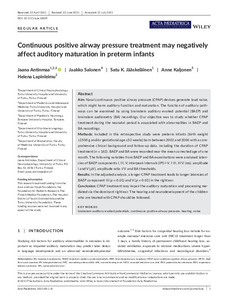Continuous positive airway pressure treatment may negatively affect auditory maturation in preterm infants
Antinmaa, Jaana; Salonen, Jaakko; Jääskeläinen, Satu K.; Kaljonen, Anne; Lapinleimu, Helena (2021-07)
Antinmaa, Jaana
Salonen, Jaakko
Jääskeläinen, Satu K.
Kaljonen, Anne
Lapinleimu, Helena
07 / 2021
Acta Paediatrica
Julkaisun pysyvä osoite on
https://urn.fi/URN:NBN:fi:tuni-202108066474
https://urn.fi/URN:NBN:fi:tuni-202108066474
Kuvaus
Peer reviewed
Tiivistelmä
Aim: Nasal continuous positive airway pressure (CPAP) devices generate loud noise, which might harm auditory function and maturation. The function of auditory pathways can be examined by using brainstem auditory evoked potential (BAEP) and brainstem audiometry (BA) recordings. Our objective was to study whether CPAP treatment during the neonatal period is associated with abnormalities in BAEP and BA recordings. Methods: Included in this retrospective study were preterm infants (birth weight ≤1500 g and/or gestational age ≤32 weeks) born between 2002 and 2006 with a comprehensive clinical background and follow-up data, including the duration of CPAP treatment (n = 162). BAEP and BA were recorded near the mean corrected age of one month. The following variables from BAEP and BA examinations were analysed: latencies of BAEP components I, III, V, interpeak intervals (IPI) I-V, I-III, III-V (ms), amplitude I and V (µV), amplitude ratio I/V and BA thresholds. Results: In the adjusted analysis, a longer CPAP treatment leads to longer latencies of BAEP component III (p = 0.01) and V (p = 0.02) in the right ear. Conclusion: CPAP treatment may impair the auditory maturation and processing mediated via the dominant right ear. The hearing and neurodevelopment of the children who are treated with CPAP should be followed.
Kokoelmat
- TUNICRIS-julkaisut [17007]
